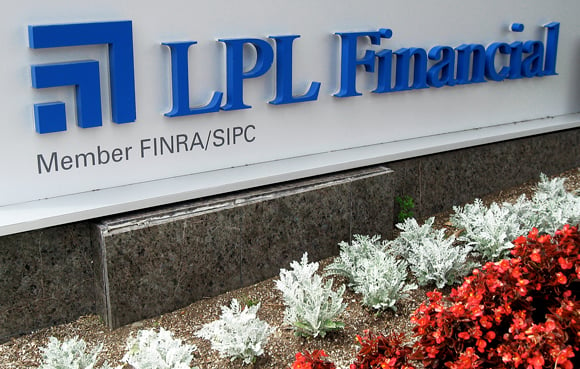Elderly couple awarded $1.4M for claim over tenant-in-common exchanges; were seeking $8M
LPL Financial LLC is on the hook for a $1.4 million arbitration award to an elderly couple who bought real estate deals. According to the attorney for the plaintiffs, the property investments relied on “tricks” to boost their yields before they collapsed.
The couple, Heinrich and Araceli Hardt, bought two tenant-in-common exchanges, one in 2007 and another in 2008, from former LPL broker David Glenn, according to a separate, continuing lawsuit the investors have filed against the sponsor of the real estate deals, Direct Invest LLC.
“There was a fraudulent picture painted of investors receiving monthly income checks from the properties,” said Brian Miller, the attorney. That cash flow “would replace the income received from income-producing properties that they were selling,” he said. “The monthly check is the focal point of sale” by the broker, he said.
The investors asked for damages of $8 million.
The Finra panel issued the award Friday and, as is typical, gave no explanation for its decision. According to the award, the Hardts, both 76, made several allegations, including federal securities fraud and elder abuse. The Hardt's claim was also filed against two other broker-dealers, Orchard Securities LLC and Meridian Capital Partners LLC, but the plaintiffs dismissed those claims in December.
“While we do not know the factual or legal basis for this award, the arbitration panel did not make a finding of elder abuse in this matter,” said Michael Herley, a spokesman for LPL. “Given the amount of the award in comparison to the alleged damages, we believe that the arbitrators rejected many, if not most, of the claimants' claims.”
Mr. Herley added that LPL played no tricks on its clients. "The TIC investors, including the Hardts, approved the operating budgets for the investment programs each year, which included projected revenue, expenses and cash flow. Thus, it's more than a little disingenuous to say the investors were 'tricked' into anything, as they were included in the budgeting process."
Dubbed a TIC, the vehicle is a form of real estate ownership in which two or more parties have a fractional interest in the property. TICs gained in popularity after a favorable 2002 Internal Revenue Service ruling that allowed investors to defer capital gains on real estate transactions involving the exchange of properties.
After the real estate bubble burst, many TIC investors saw their properties falter.
One of the biggest TIC sponsors, DBSI Inc., declared bankruptcy in 2008, and broker-dealers that sold those deals have faced dozens of arbitration complaints filed with Financial Industry Regulatory Authority Inc.
This claim against LPL did not involve DBSI but another sponsor, Direct Invest.
The broker, Mr. Glenn, left LPL in 2010 and is now affiliated with United Planners' Financial Services of America. Mr. Glenn was not named in the complaint.
“When these deals were structured, they used tricks,” Mr. Miller said. A euphemism known as a “yield enhancement” for the TICs relied on “borrowed money” and “returning investors' money back to them,” he said.
The two real estate deals in question were "not producing any natural cash flow," Mr. Miller claims. Distributions were made for a couple of years, and then "the money ran out. The defense in the case is, everybody was doing it. And we said, ‘No, this is wrong.' It was clear LPL knew that these yields were not being generated by [the properties] but by financial trickery.”
Mr. Miller declined to comment about other potential clients who may have filed TIC arbitration claims against LPL Financial.
“Reserve accounts were established to pay for anticipated expenses, such as tenant improvements and leasing commissions,” Mr. Herley said. “These accounts were typically required by the lender and were disclosed in the offering documents, which were offered only to accredited investors.”
He added that the structure of the programs and the projected cash flows were described and disclosed in comprehensive private-placement memoranda. “As everyone knows, the commercial real estate market experienced an unexpected and historical decline beginning in 2008 which also impacted these programs,” Mr. Herley said.
According to the federal lawsuit, which was filed last year in U.S. District Court for the Southern District of California, the Hardts purchased their first TIC in December 2007 at a price of $3.7 million, with $1.6 million in cash and the remainder the assumption of a loan.
They bought the second TIC in March 2008 at a purchase price of $4.2 million. About $1.8 million was in cash, with the balance the assumption of a loan.
Both TICs owned commercial properties in the suburban Boston market.
By the end of 2009, the Hardts stopped receiving payments on both deals, according to the lawsuit.
Documents for the private-placement offerings by the sponsor, Direct Invest, “contain multiple false and misleading statements regarding the strength and experience of the manager and property manager, the stability of the cash flows, the potential for appreciation, the superiority of the location, the nature and strength of current projected conditions for the greater Boston office market, the strength of the leases and their corresponding projections, the building fundamentals, the use of proceeds, and the purchase price in relation to the replacement cost,” according to the lawsuit.
A lawyer for Direct Investments, Brandon Reif, did not respond to an e-mail seeking comment.







